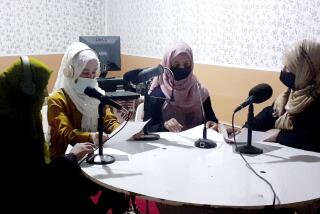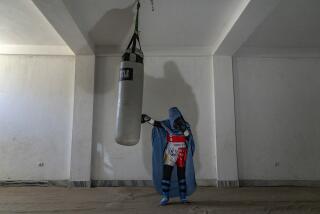Afghanistanâs new generation: Modern, ambitious ... naive?
KABUL, Afghanistan â Behind the thick walls of one of Kabulâs newest districts, Tooba Hotak practices driving her parentsâ Mercedes in a parking lot lined with cream-colored apartment buildings.
The car lurches as she tries shifting gears, but the 16-year-old drives on, past a cluster of stores and a playground full of children chasing one another in the snow.
Later, she slips into a pair of fluffy slippers for a chemistry class in her familyâs plush living room.
PHOTOS: Afghanistanâs new generation
Tooba is being home-schooled in the British education system. She hopes to go to college and become an engineer. Marriage, children â âthatâs not so important,â she says.
Like many middle-class Kabul residents of her generation, Tooba lived most of her life abroad. She wasnât born yet when Soviet forces pulled out of the country in 1989, unleashing a civil war that eventually gave rise to the Taliban and drove her family into exile in China.
They returned after the U.S.-led invasion in 2001 to a city that had shaken off the most rigid strictures of the Islamic militantsâ rule, which denied girls an education and kept them largely confined to their homes.
Although large parts of the population still struggle to survive in overcrowded slums, these teens and young adults live in modern apartments, shop at Western-style malls and supermarkets, swap text messages on their cellphones, celebrate weddings at neon-decked halls and are connected to the world through television, movies and the Internet.
Tooba doesnât worry about what her life might look like after the departure of most U.S. and allied foreign troops next year.
âIt will be the same,â she says, nibbling a date. âThis is a dangerous place for Americans, but not for Afghans.â
Her tutor, Naela, looks up from her laptop. âYou think you will be driving after the Taliban come?â snaps the teacher, who, like many Afghans, uses one name.
âThey will kill you,â she says, running a finger across her neck.
Young Afghans such as Tooba belong to a small but growing class of professionals, business owners and civil servants, a manifestation, in part, of the influx of foreign aid, investment and personnel that has accompanied Western military intervention.
Educated and ambitious, they may represent their nationâs best hope for a stable future.
Those too young to remember the Taliban may exhibit a blithe confidence, but others are worried, some to the point of making plans to leave, all too aware of the dangers that lie ahead.
***
Aria City, the north Kabul district where Tooba lives with her parents and two sisters, is one of several gated communities catering to white-collar Afghans, offering such prized amenities as central heating and air conditioning, round-the-clock running water and private guards.
Beyond the quiet, tree-lined lanes where Tooba practices driving, honking cars jostle for space on rutted, muddy streets with armored convoys, rickety bicycles, donkey carts and vendors. Designed to be largely self-sufficient, the housing development has its own playground, school, stores, restaurant and mosque.
Hazhir Hoshan, 17, and his high school pals escape the fray and settle into the menâs section of the Aria City restaurant. They order a round of chicken burgers and Mountain Dew.
The boys laugh off any thought of another all-out civil war.
âThere are many modern men here in Afghanistan,â Hazhir says, âso I donât think the war will begin again.â
His friend Abdullah Hakimi, also 17, nods. âThe Taliban just come with big turbans and long beards,â he says between bites. âI think they look funny.⌠They are not as strong as people think.â
Abdullah admires the NATO-trained Afghan army and wants to be a military doctor.
âHe likes guns!â Hazhir teases.
No, Abdullah says, âthe military needs doctors. The civilian doctors are fleeing from the war zones.â
The afternoon stretches before them. They think they might drive over to Gulbahar Center, a downtown shopping mall where young men in skinny jeans and gel-sculpted hair go to catch a movie, play video games or challenge one another on a bucking bronco machine.
Afghanistan is âlike a new child,â Hazhir says. âItâs good now. We go to school, play football.⌠We can have fun together.â
***
The mall, which opened four years ago, is a mash-up of brash Western styles and more conservative Afghan tastes. Fashion-conscious customers browse through aisles of short, strappy dresses, expensive cosmetics and the latest high-tech gadgetry. There is even a tattoo parlor.
Tucked into a corner on the third floor are two new shops, one selling modest black robes and head scarves, the other lingerie in delicate floral and camouflage prints.
Omid Mesrabi, 23, opened the businesses last month with money he saved while working at an embassy for six years. He runs the Islamic dress store, and his sister Muzhda, 18, takes care of customers in search of more intimate apparel.
Both shops are doing well, he says, and he is already thinking of expanding. âMy plan is to be a really successful businessman, not [just] a shopkeeper.â
His family never left Afghanistan and he remembers all too well the days when rival Islamic militias rained rockets down on Kabulâs neighborhoods. Mesrabi is excited about the changes.
âThings are getting better day by day,â he says. âWe didnât have good roads, buildings or centers like these. But now we have them.â
He adds with a sardonic smile: âEven the suicide bombers are improving. They are killing more people.â
An ambulance packed with explosives was detonated outside the mall during a high-profile assault on the city center in 2010. Visitors are asked to check their guns at the entrance and submit to a thorough search.
âWe suffered 40 years of war, and after this, maybe war will come back,â Mesrabi says. âBut itâs not something to worry about. We are used to it.â
He is more concerned about the economic fallout from the departure of foreign forces and their consultants and contractors. Mesrabi says his best customers are people who work for foreign businesses and nonprofits, many of which are already scaling back.
But he says he wonât be joining any rush for the exits.
âAfghanistan needs me,â he says. âI want to be an example. I brought my sister here to work. Brothers never accept that.⌠We are the people to change othersâ minds.â
***
With her spiky heels, can-do attitude and successful television career, Zarlasht Baiza, 23, would seem to epitomize the opportunities that have become available to urban Afghan women in the last decade. But she is the first to point out her special circumstances.
âMost families are not allowing girls to work for a TV station,â she says over a smoothie at one of the cityâs smart new cafes. âMy parents died [of cancer] when I was little. I have a brother and a sister. But they are younger than me, so they canât stop me.â
Baiza was just 16 when she started working at the private Ariana Television Network. It was several years before the station agreed to put her on the air. She has made enough money to pay off the debt on her parentsâ house and provide for her siblings.
She has a loyal following among Afghan homemakers because of a regular feature she does on the latest trends in decor, fashion and cosmetics. But she has also attracted the attention of anonymous callers who tell her that women have no business being on television.
âInstead of showing yourself on camera, go beg in the streets. Itâs better,â one menacing voice told her.
Several times the callers informed her they were outside her home. Then the siblings would hear loud banging at the gate.
âAll three of us would cover ourselves with blankets, so we wouldnât hear the banging,â Baiza says.
She reported the calls to the police, but no arrests were made.
âWe will talk after 2014,â the threatening voice on the phone told her.
There has even been pressure from the current government, which last year asked female TV presenters to wear head scarves and avoid heavy makeup.
âSometimes I wonder what will happen if the Taliban take over again,â Baiza says. âAlthough we say there has been a lot of progress in the last 12 years, as we move closer to 2014, the situation is getting more restrictive for women because they are worried about what is going to happen.â
She says she knows several women who have quit their TV jobs because of family and public pressure.
âI love my job as a producer and reporter,â she says. âBut maybe before the end of 2014, I will leave [Afghanistan] for a few months and see what happens.â
Special correspondent Hashmat Baktash and Times staff photographer Carolyn Cole contributed to this report.
More to Read
Sign up for Essential California
The most important California stories and recommendations in your inbox every morning.
You may occasionally receive promotional content from the Los Angeles Times.










